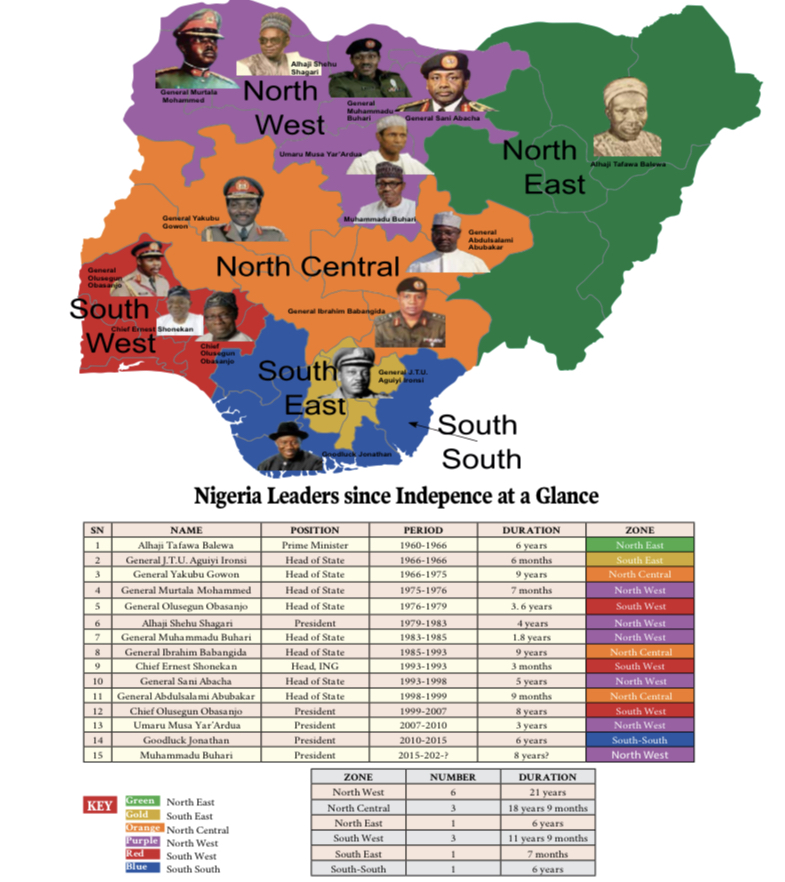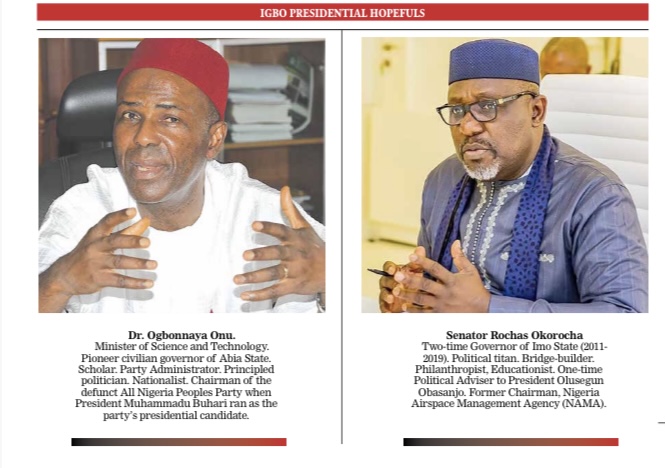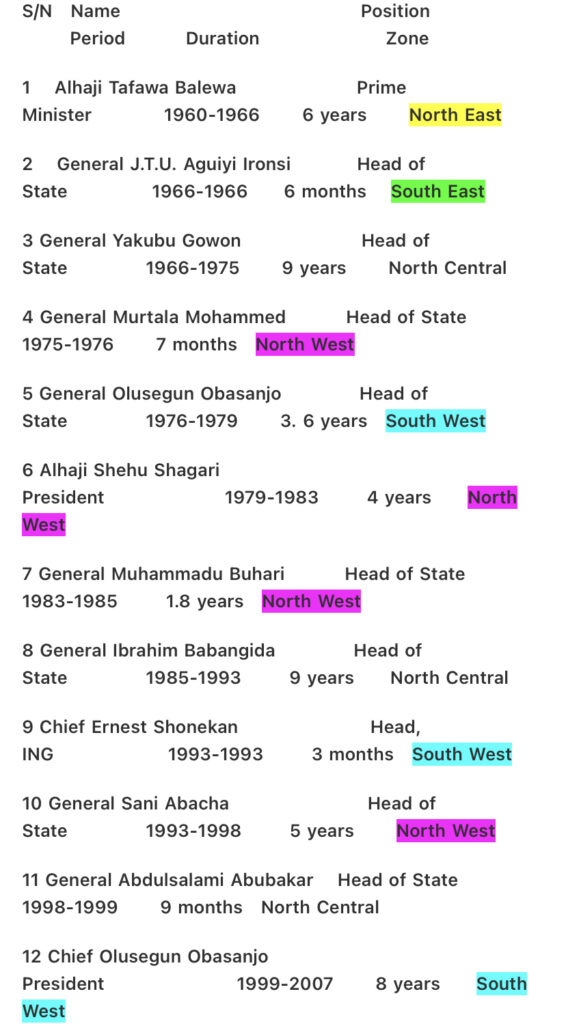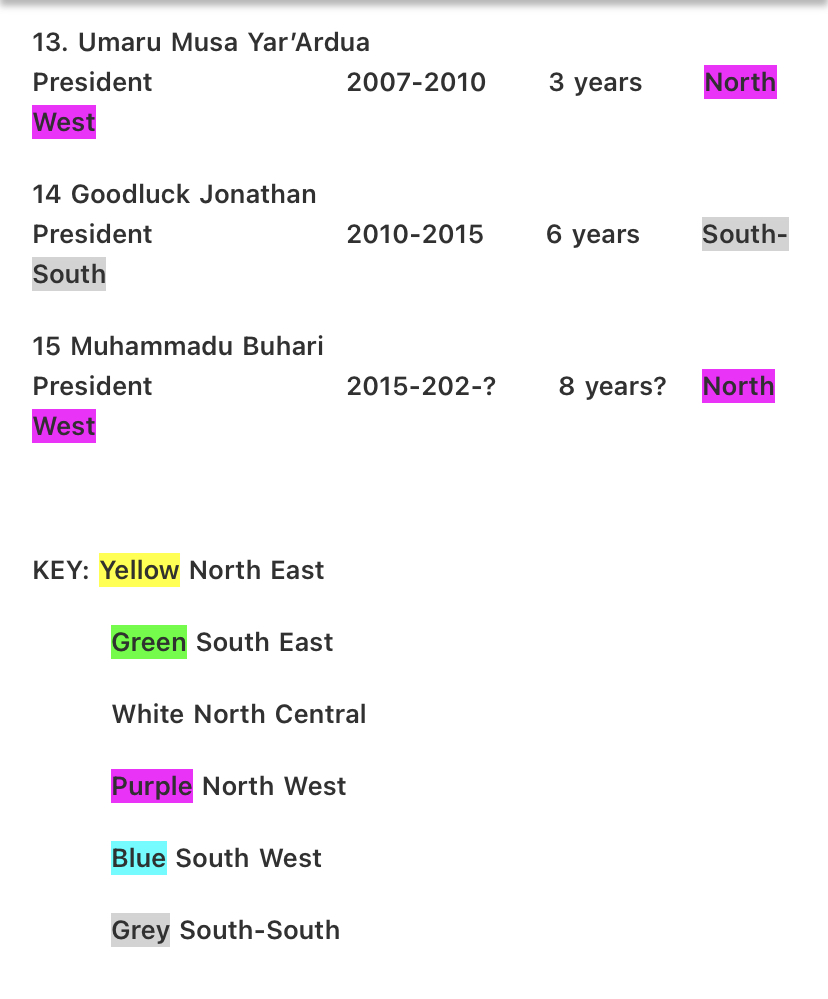South East and the Politics of Nigeria’s Presidency
Our Political Correspondent reports on the quest by the people of the South-East to produce Nigeria’s next president in 2023 despite political manueverings across the various political parties by other geopolitical zones and power blocs
Less than two years to the next general election, Nigeria’s political landscape is agog with permutations, especially as to which zone and even individual, to occupy the coveted position of Office of the President.
The incumbent president, Muhammadu Buhari, is expected to bow out on May 29, 2023, after serving out the constitutionally allowed two terms. Already, the Independent National Electoral Commission (INEC) has announced February 18, 2923 as the date for the poll for Buhari’s successor.
The President, on his part, has given a hint about his retirement plan. He said he will retire to Daura (his hometown). “This is my second and final term, at the end of which I will, God willing, go to Daura and settle down.” He revealed this in March 2019 before his inauguration for a second term.
At the moment, it is a subtle but fierce debate over, where power should shift to as well as the likely heir to the coveted throne. Geopolitical zones and even names of some personalities are presently being touted, with some continuously resonating.
The zoning debate
On paper, power is expected to shift to the South in 2023 given the zoning arrangement between the country’s two geographical divides – North and South – which took effect in 1999. However, indications are that the battle for the 2023 presidency may go beyond that if emerging developments in the polity are anything to go by.
The North, for instance, seems not disposed to relinquishing power after Buhari. Indication to this emerged shortly after the President’s re-election in February 2019. The euphoria over his victory at the polls had hardly gone down when some northern political leaders started canvassing the need for their region to hold on to power beyond 2023.
Their clamour was stemmed on the need for the North to have at least another four years after Buhari’s eight years for the region to be at par with the South.
The present democratic dispensation is 22 years old and the power rotation arrangement, though not constitutional, has seen the South have the presidency for 13 years through Chief Olusegun Obasanjo (South-West, 1999-2007) and Jonathan (South-South, 2010-2015). For the North, it would be 11 years in power by the time Buhari completes his second term in 2023 (2015-2023) as Umaru Yar’Adua, who succeeded Obasanjo in 2007, passed on barely three years in office.
The plot by the North started like a pun, when the national president of Arewa Youth Consultative Forum (AYCF), Alhaji Yerima Shettima, said in a media interview that there was no going back for the region’s bid for the 2023 presidency, but later gained the support of most northern political elites.
They made a case for the abandonment of the zoning arrangement, not only for the Office of President, but for other political offices as currently obtainable in the country.
But most political leaders in the South have continued to insist that canvassing for an end to rotational presidency at this point in Nigeria’s history is not in the interest of the country. According to them, Nigeria’s unity is presently under threat over rising insecurity, so abolishing zoning might lead to civil and constitutional crisis, which may aggravate the issues on ground.
South-East insists on taking turn
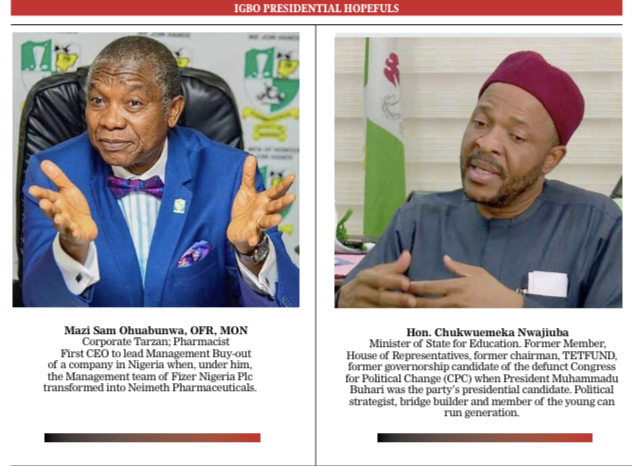
While the list of political gladiators across the various geopolitical zones jostling to succeed Buhari keeps growing by the day, Ndigbo of South-East Nigeria are insisting that 2023 is the time for one of their own to lead the country. They predicate their quest on the principle of equity and fairness.
According to them, besides Dr. Nnamdi Azikiwe, who was a ceremonial president (1963-1966) and Major General Johnson Thomas Aguiyi-Ironsi, who was military head of state between January 16 and July 29, 1966, no Igbo had led Africa’s most populous nation in the last 50 years.
This and other perceived imbalances in the system, the advocates of a Nigerian president of Igbo extraction, say, have left the people of the South-East to continue to cry marginalisation. Particularly, they pointed out that the people of the South-East have over the years, insisted on an additional state to bring them at par with other zones of the country, with no one listening to them.
The South-East has five states – Abia, Anambra, Ebonyi, Enugu and Imo – while the South-South, South-West, North Central and North-East have six states each. The North-West tops the chart with seven states.
No doubt, the clamour for a Nigerian president of Igbo extraction had always gained momentum every election year since 1999, but the questions most analysts do ask against this backdrop are: How feasible is a president of Igbo extraction and why did previous demands not translate to reality?
The closest the Igbo have come to making it to power was the failed bid by former Vice-President Alex Ekwueme (now late) for the presidential ticket of the Peoples Democratic Party (PDP) during the build-up to the 1999 elections.
It would be recalled that Ekwueme had rallied like-minded politicians and statesmen under the auspices of the G-34 to stand up against the dictatorship of the then Head of State, General Sani Abacha, at a time most of his contemporaries scrambled to curry the favour of the junta.
The former vice-president led the group to speak up for democracy and served the military a red card in 1998. That singular effort is partly responsible for the democracy Nigerians are enjoying today
However, if Ekwueme’s display of raw courage marked him out as a hero of democracy, his strength of conviction, undying belief in party supremacy and the principle of politics without bitterness came to the fore at the Jos presidential primary election of the PDP he helped to form.
He had been tipped to emerge the party’s flag bearer for the 1999 presidential poll, but last minute political horse-trading denied him the ticket. He was defeated by Olusegun Obasanjo (a former Head State), who was not anywhere in the calculation before then. Obasanjo, who had just been freed from jail after being linked to a phantom coup against Abacha was drafted into the presidential race by a cliché of past and serving military top brass, who were bent on having their anointed emerge as president in the post-military era.
Besides the role played by the generals and PDP’s internal politics that led to the emergence of Obasanjo as the party’s standard bearer, the other two parties at that time; All Peoples Party (APP) and Alliance for Democracy (AD), entered into an alliance that saw to the emergence of a former Minister of Finance and one-time Secretary to the Government, Chief Olu Falae as their candidate.
The belief then was that allowing the South-West, where Obasanjo and Falae hail from to produce a successor to General Abdulsalami Abubakar would pacify the Yoruba for the deep ethnic hurtnursed by the Yoruba following the annulment of the June 12, 1993 presidential election, won byson, Chief Moshood Abiola who later died in detention.
Since the 1999 elections, the highest the Igbo have gotten from the dominant political parties was vice presidential tickets. However, some Igbo sons have taken shots at the country’s number position but they did so under what many describe as “fringe parties” hence they made little or no impact at the polls.
Ohanaeze galvanizes Ndigbo for 2023 battle
While the insistence by some northern political leaders that their region takes another shot at the presidency after Buhari gains more support from people across their region, there are some from the area and beyond – South-West and South-South inclusive – who are of the view that the South-East should be given the opportunity come 2023.
For these political leaders, allowing the South-East to produce the next president will give them a sense of belonging in Nigeria as well as promote national unity and cohesion. But given the dynamics of politics, discerning minds are of the view that only political neophytes would wish away the plot by some northern political leaders given the postulations and subtle moves to discard the zoning arrangement, which undoubtedly favours the South, particularly the South-East in 2023.
The machinations, notwithstanding,the apex Igbo body, Ohanaeze Ndigbo, had persistently maintained that the South-East should produce the next president if there must be justice and fairness in the system. The campaign was started by the immediate past President General of the group, Chief John Nnia Nwodo. His successor, Prof. George Obiozor, a renowned diplomat, has not failed to seize any opportunity to drum it that anybody who denies the fact that it is the turn of the Igbo to lead the country after Buhari is deliberately throwing the country into chaos.
Whither South-East in 2023 calculation
The question against emerging political developments ahead of the 2023 presidential election is: Will the ruling All Progressives Congress (APC) and main opposition PDP zone their presidential tickets to the South-East given the conviction that they are the only possible platforms to power at the moment?
While politics is a game of the possible in which nothing is foreclosed, most analysts believe that the chance of the Igbo getting the presidential ticket of any of the two major parties hangs in the balance. Reasons for this are not farfetched. Besides Imo and Ebonyi states, which the APC presently controls in the South-East, the ruling party has trifling structures in other states of the zone.
APC won only three out of the 15 senatorial seats in the zone and pockets of House of Representatives seats, mainly in Imo and Abia states during the 2019 elections. Though many described this as an appreciable result compared to the 2015 elections, when the party was almost rejected in the zone, the highest position the APC-led Federal Government offered the South-East was Senate Minority Whip, occupied by a former governor of Abia State, Senator Orji Uzor Kalu.
Against this backdrop, the belief in most political circles is that the ruling party, presently under the guidance of a caretaker committed headed by the governor of Yobe State, Mai Mala Buni, is more likely to consider the South-West, where it has a strong base (five out of the six states) than the South-East if its leadership decides to zone the 2023 presidential ticket to the South.
The same scenario might also play out for the South-East in the PDP. Though the party leadership has not officially declared its stand on the issue, the signs are clear that 2023 presidential ticket is north bound, especially with the party’s 2019 candidate and former vice president, Atiku Abubakar, showing interest.
Igbo leaders speak
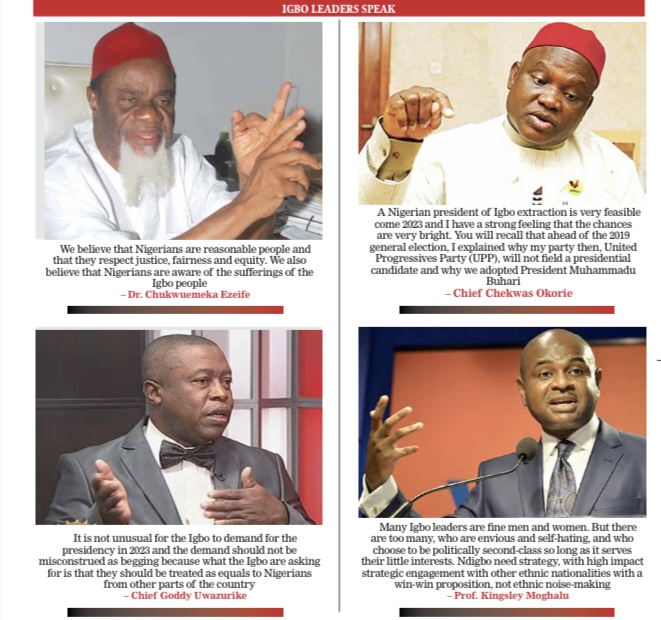
While it might be too early to draw conclusions on where the political pendulum would swing to as regards the presidential tickets of the two major parties, some analysts, who weighed the options presently on ground, are of the view that the best either APC or PDP will offer the South-East is a vice presidential ticket but the question against this backdrop is: Will that be acceptable to Ndigbo?
Despite the cautious optimism over the 2023 presidency, especially the bid by the Igbo, some Igbo political leaders expressed the belief that a Nigerian president of Igbo extraction is possible after Buhari though there are pockets of dissenting voices.
Dr. Chukwuemeka Ezeife, a former governor of Anambra State, who warned on the consequences of denying Ndigbo power in 2023, said: “We believe that Nigerians are reasonable people and that they respect justice, fairness and equity. We also believe that Nigerians are aware of the sufferings of the Igbo people. There are three major ethnic groups in Nigeria; the Hausa/Fulani, Yoruba and Igbo; the first two have had their turns when it comes to the Office of President, while Ndigbo have never had.
“But we are not saying that the presidency should be given to us as a free gift; we are going to work hard for it. We will lobby the North, South-West, South-South and the Middle Belt. We are going to be united in the struggle and we shall do whatever is expected of us to produce Buhari’s successor.
“However, if after doing all everyone expects us to do and our candidate fails to win because he is Igbo, we will take it that the rest of Nigeria have denied the country’s citizenship to the Igbo. Those who are saying that some of our people are talking about Biafra and as a result, the Igbo should not be allowed to produce the next president are talking rubbish. They are the ones pushing the Igbo to leave Nigeria.
“The moment the Igbo are allowed to lead the country, all agitations and even clamour for secession will cease because our people will see themselves as having been fully integrated into Nigeria. So, we expect the APC and PDP to zone their respective 2023 presidential tickets to the South-East as a starting point towards realizing a Nigerian president of Igbo extraction.”
For Chief Chekwas Okorie, a member of the All Progressives Congress (APC) and a chieftain of Ohanaeze Ndigbo, political alliance is the way to go. He also said that logically speaking, other Nigerians should look in the direction of the South-East on the basis of equity and fairness though political positions are earned democratically.
His words: “A Nigerian president of Igbo extraction is very feasible come 2023 and I have a strong feeling that the chances are very bright. You will recall that ahead of the 2019 general election, I explained why my party then, United Progressives Party (UPP), will not field a presidential candidate and why we adopted President Muhammadu Buhari.
“I made it clear that four more years of Buhari would be better for Ndigbo than eight years of Atiku Abubakar and even the APC practically adopted that as a campaign slogan. I also advanced the argument that the Igbo should not put all their eggs in one basket, so that we will be able to engage other political blocs after President Buhari had done eight years.
“Luckily, President Buhari won the 2019 election convincingly and we are now heading to that of 2023. So, irrespective of the present state of the APC in the South-East, we will do everything possible as members of the party in the zone to come together and deliver Anambra to the APC in the forthcoming governorship election in the state.
“If that happens through hard work because it remains a democratic contest, it will mean that APC will be in charge of three out of the five states of the zone. Three states for APC in the South-East will take the party to the heart of the Igbo people, who constitute the second largest population in all the states of the federation except the south eastern states, where the Igbo is 99.9 per cent of the population. It will also amount to an enormous spread if APC can penetrate this huge number, and it will help the Igbo in their engagement with other political blocs.
“Besides this, the South-East can also leverage on the political alliance it has always had with other sections of the country, especially the North. You will recall that in the First Republic, the Eastern Region led by the Igbo people had a political engagement with the North, which led to the Northern Peoples Congress (NPC) and National Council of Nigeria Citizens (NCNC) coalition that formed the government of that republic.
“Also, in the Second Republic, the National Party of Nigeria (NPN) entered into an alliance with Nigeria Peoples Party (NPP) led by Dr. Nnamdi Azikiwe and that explained how Chief Edwin Ume-Ezeoke of the NPP became the Speaker of the House of Representatives. That alliance that gave the Igbo the position of vice president (Ekwueme on the platform of NPN) and speaker of the House of Representatives has not repeated itself ever since.
“So, any political alliance between the South-East and the North through the APC is not going to be strange but a coalition that will repeat history. That is why we should be able to win Anambra as the outcome of the state’s governorship election is fundamental to our demand to produce the next president through the ruling party.”
Chief Goddy Uwazurike, a lawyer and former president of Aka Ikenga, an Igbo think tank, also said the quest for power by Ndigbo will ensure equity.
His words: “It is not unusual for the Igbo to demand for the presidency in 2023 and the demand should not be misconstrued as begging because what the Igbo are asking for is that they should be treated as equals to Nigerians from other parts of the country. So, I expect the two main political parties, APC and PDP, to zone their tickets for the 2023 presidential election to the South-East. There are south easterners in both parties and all they need to do is to organize primary elections for those who will indicate interest to fly their respective flags in the presidential election.
“We witnessed this during the 1999 elections, when the PDP and the defunct APP fielded two south westerners, Chief Olusegun and Chief Olu Falae as well as during the 2019 general election, when APC and PDP fielded two northerners, Muhammadu Buhari and Atiku Abubakar.
“For those rooting for the North to retain power after Buhari, I will say that they should face the reality…I must add that I am happy that the people of the South-East are taking the necessary steps towards realizing a Nigerian president of Igbo extraction come 2023.
“They do not really need to be shouting; all they need is sustained consultation with the rest of the country as it is only natural that other parts of the country will buy into the project on the basis of justice, equity and fairness. But to those Igbo, who hold the view that the 2023 presidency project is not realizable, I want them to note that there is saying that ‘a faint heart never won a fair maiden.’
Prof. Kingsley Moghalu, a former Deputy Governor of the Central Bank of Nigeria (CBN) and presidential candidate of Young Progressive Party (YPP) during the 2019 election, who also spoke on the issue, advanced that whatNdigbo need is strategy.
“Nigerian Igbo complain about political ‘marginalization.’ While true because of the civil war and while Nigeria needs ‘a new grand bargain’ between its ethnic nationalities, the Igbo themselves have harmed themselves. They must first shed victim mentality.Then they must address the disadvantage of being ‘led’ by selfish, greedy and self-centred political elite masquerading as political and social-cultural leaders, who are the first to shoot down their own.
“Many Igbo leaders are fine men and women. But there are too many, who are envious and self-hating, and who choose to be politically second-class so long as it serves their little interests. Ndigbo need strategy, with high impact strategic engagement with other ethnic nationalities with a win-win proposition, not ethnic noise-making.
“Do you think it’s a surprise that Barack Obama became United States president despite the attempts of many other black Americans like Jesse Jackson? Obama succeeded because he did not have a chip on his shoulder, though he acknowledged the systemic injustice of racism. But he had a proposition, not just a sense of entitlement. He was able to largely because he was the son of Kenyan man and a white American mother who did not descend from a line of former slaves and therefore was spared of their psychological insecurities.
“The joke in Kenya is that a Luo (his father was from the Luo tribe) could be a United States president but not a Kenyan one! I ran for president in 2019 as a Nigerian candidate, not as an Igbo candidate, and no apologies. I love Ndigbo. But I also love other Nigerians, unburdened by the hang-ups of history. All of thisis not to say we should not deal with the civil war in our national history. It is the elephant in the room. I have argued that Nigeria’s leaders must apologize for the millions of lives lost in the Nigeria-Biafra war if we are to heal. That’s the right thing to do.”
Nigeria’s leaders since independence at a Glance
Zone Number Duration
North West 6 21 years
North Central 3 18 years 9 months
North East 1 6 years
South West 3 11 years 9 months
South East 1 7 months
South-South 1 6 years

